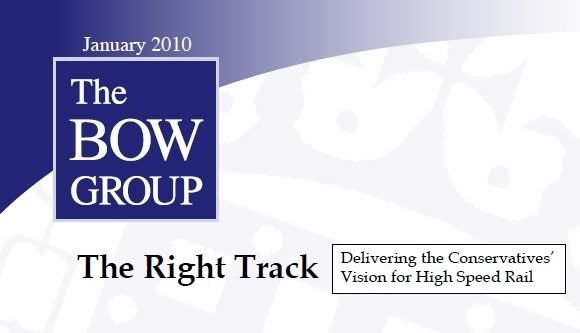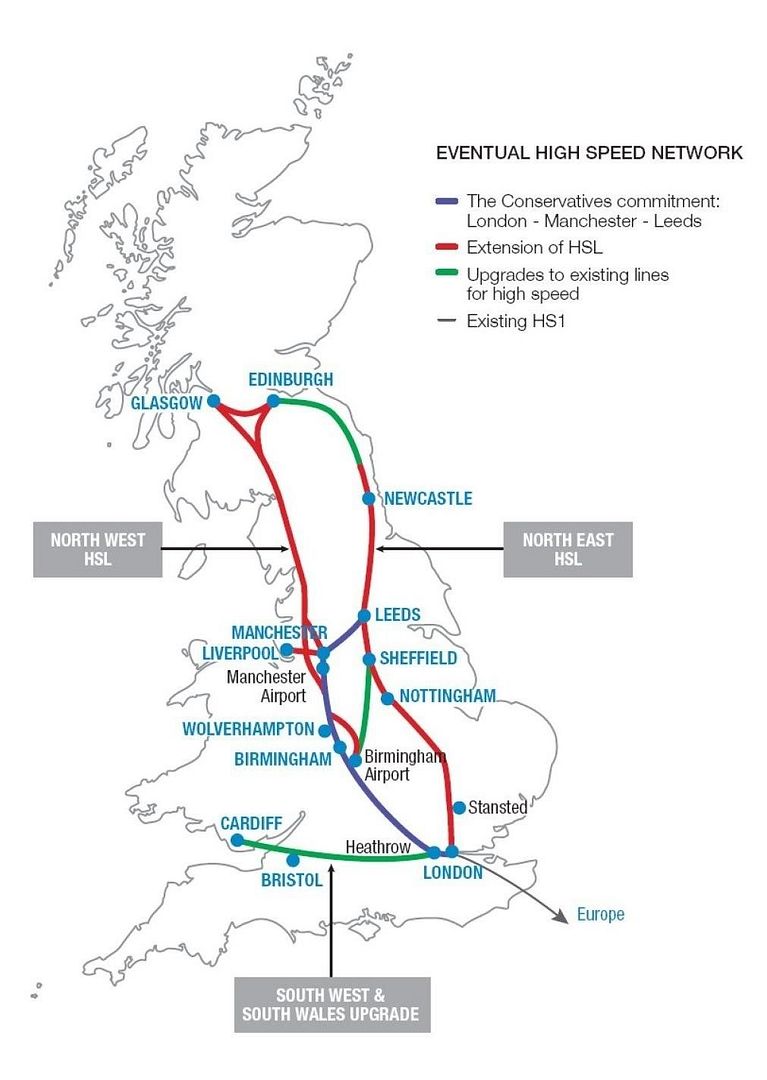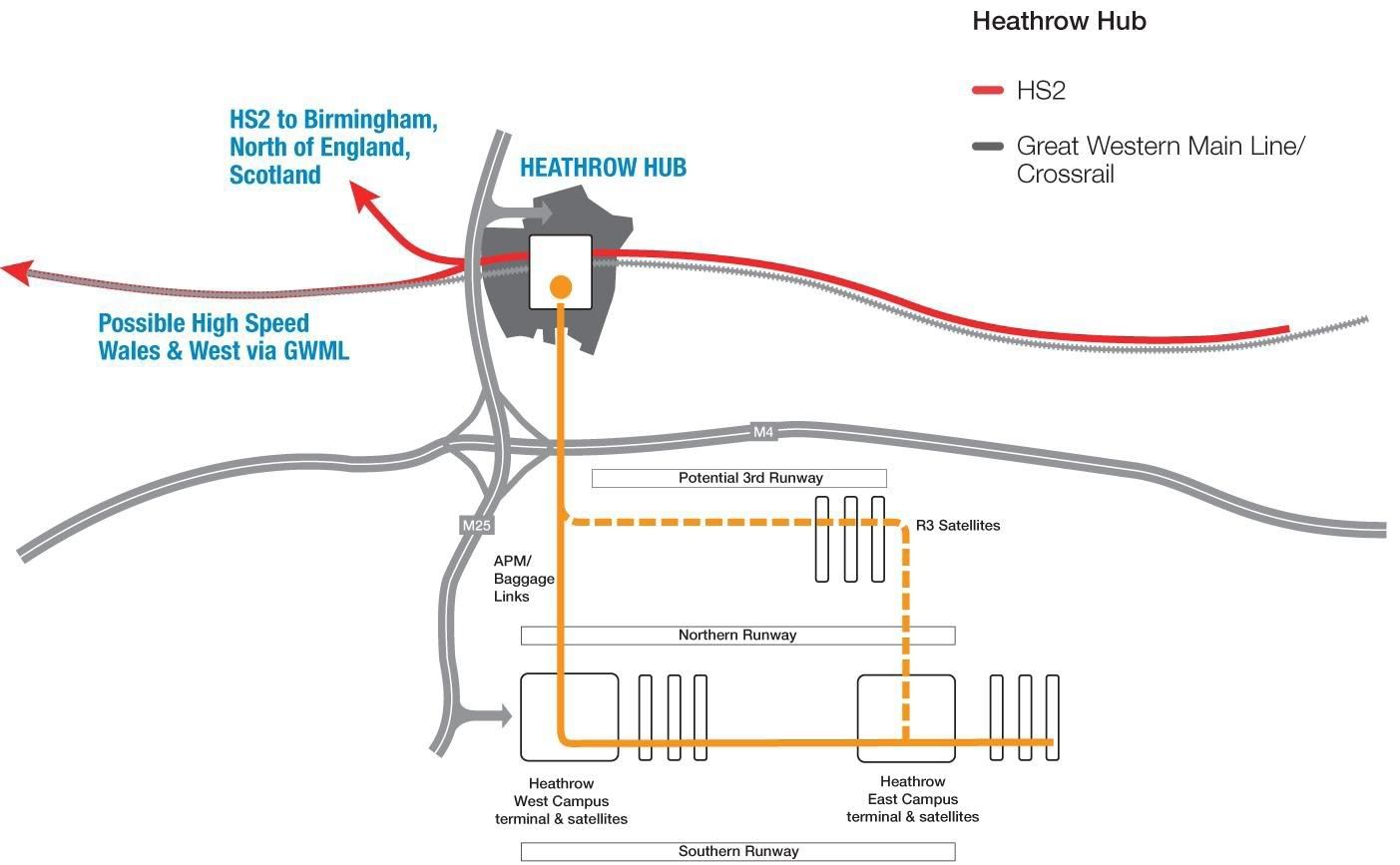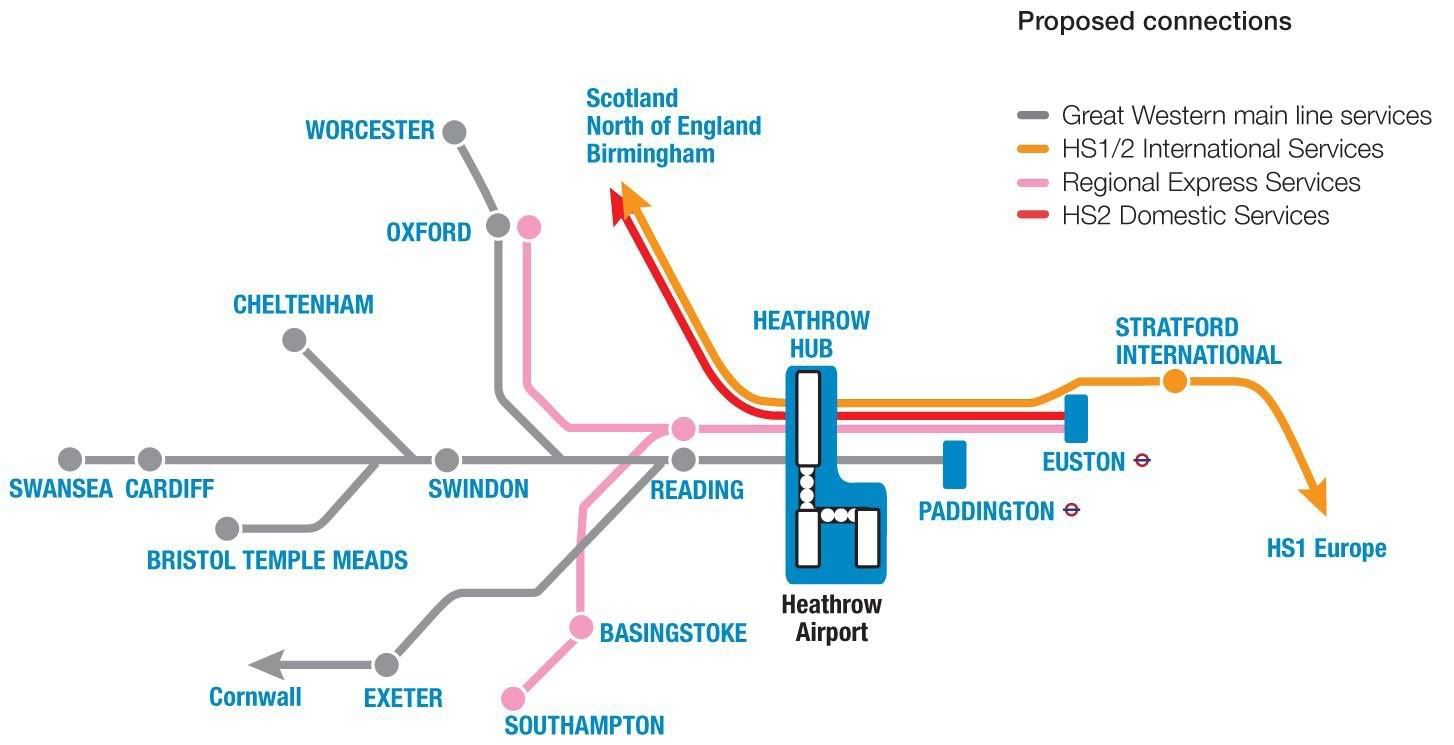There has been lots of discussion over the last year about Britain’s High-Speed Rail network, or rather its lack of one, and there have even been promises made about electrifying the Great Western Main Line from London to Cardiff and possibly Swansea. Ignoring the obvious electioneering and political gamesmanship, this issue has major implications for the Welsh economy, and needs to be looked at carefully.
There have been a number of reports published by various rail lobby groups and there is a report due to be published soon by the UK government, but the most significant one is arguably this one published last month by the Bow Group:
The Bow Group who are a Conservative policy body, and considering that the Conservatives are almost certainly going to form the next UK government their views are particularly relevant.
Before considering the Welsh implications in more detail, their report proposes a new High Speed line – HS2 – running from London Euston to Heathrow then on to Birmingham, Manchester and Leeds. The line would allow direct connection to the existing HS1 line to Paris and Brussels, and could be extended later from Manchester to Glasgow and from Leeds to Newcastle and Edinburgh.
The report comes out very strongly in favour of routing the line via Heathrow, where a major transport interchange would be created, linking HS2, The Great Western Main Line, CrossRail and local services. This station would be situated a few km north of the airport itself, adjacent to the M4 and M25 and with a people mover system used to shuttle passengers from the station around the various airport terminals.
And it is the Heathrow Hub which is key to Wales. As a frequent flyer myself, it is very difficult to get to Heathrow from Wales by train, and many businesses will have chosen not to locate in Wales because of its poor air connections. But simply by locating a HS2 station at Heathrow – adjacent to the GWML, it immediately makes Heathrow more accessible from Wales, reducing the connection time significantly as well as providing an opportunity to connect to international trains with a simple cross platform transfer.
But the report goes further than that – it notes that the GWML is already built to an excellent alignment and could easily be upgraded to a 200 mph capable route mostly by just resignalling, although the Severn Tunnel would remain a bottleneck. It even suggests that a high speed GWML would be completed before the HS2, reducing the Cardiff–Heathrow journey time to as little as 1 hour. This would make South-East Wales a much more attractive location for international businesses.
The report does not make any specific proposals for North Wales, although a station at Manchester Airport is proposed which would effectively become the gateway to North Wales, and we need to ensure that the North Wales railway network can connect directly to Manchester Airport in order to reap the same benefits as HS2 will bring to the South.
For some information and discussion about various other High Speed Rail proposals, please look at this page on the Syniadau Forum.
14:30 - Monday 22 February 2010
MH: These two images from the Bow Group's report show the location of the Heathrow Hub in relation to both the airport and to the wider rail network. Not only would it be easy to get to Heathrow from south Wales (and the south west of England) directly by rail, but it would also be possible to change at the Heathrow Hub to catch a High Speed train directly to Europe.
Passengers from mid Wales would travel by rail to Birmingham, and passengers from north Wales to an interchange just south of Manchester, in order to catch a HS train to directly to Europe.
At present only 27% of journeys to Heathrow from south Wales are made by public transport, either train or bus. 73% of journeys are made by car or taxi. From south west England the figures are 34% and 66%.






14 comments:
Well, its a YES and NO from me (and no, I'm not a Lib Dem!).
These proposals are much more constructive than many others that have been waved around.
YES: As someone who has spent far more hours of his life commuting to London from Wales than can possibly be justified in a sensible plan of life, I welcome it.
NO: This is a scheme that is 30 years out of date. Technology and economics will make it redundant long before it is realised in, at best, another 30 years.
. . .
I used to go to London so that I could look people in the eye when we discussed things, and react and decide accordingly. USA and European capitals likewise. At the time it was the only way.
The phone doesn't quite do it, because of that 'eye' bit. However, developing technologies, Skype being one, which are still in their infancy, change things fundamentally.
Collaborative working over global geographic distances has been around for at least 20 years, but it is finally reaching maturity.
If I can be on-line with a number of geographically dispersed people , real-time, for the whole of my working day,then why should I subject myself to the ever increasing distress of travelling?
The only thing I can't imagine being achievable like this is the sense of smell, and the perks of travelling - nice meals etc, and who needs those in a business relationship?
An interesting nod in this direction in today's Observer, regarding the music industry.
http://www.guardian.co.uk/technology/2010/feb/21/the-networker-john-naughton
Yes, we have to plan for the future, but we should do it based on the view that we have of how things WILL look, not on how they HAVE looked. Good examples of thinking predicated on past patterns are Trident (how are we going to use Nuclear weapons against AlQida?) and Identity cards (they might have been useful against German spies during WW2, but how would they have stopped the 7/7 bommers?.
I'd much rather see a N/S link in Wales, as that would not be a business matter, but rather a matter of national identity.
Sorry, but I think we should spend the money on a super high speed, infinitely upgradable communications infrastructure, so it's a NO. Neither will happen if Westminster have anything to do with it.
I'd much rather see a N/S link in Wales, as that would not be a business matter, but rather a matter of national identity.
Agreed, perhaps someone can explain to me the relationship between WAG and ATW and how the hell ATW get a franchise or how often they tender for the franchise? There are train companies who provide superior service to ATW why don't they get a look in. Is there anyone out there on Rail User Groups or other groups that can fill my knowledge gap?
Siôn, whether late or not I think High Speed rail links are needed, and will happen. While I liked the Tories original commitment to some HS rail link, I didn't think much of the original Tory plan, because it seemed like a very convoluted way of getting to Leeds, and the original spur to Heathrow made no sense, as I said at the time here.
I look at this as a welcome improvement on the original, which makes it a very great deal better than it was in two ways: first it puts things in an overall context to produce a network rather than just one single line, and second it takes in Heathrow on the route itself. If you look at the thread on the Syniadau Forum, I explain why I think it's such a good idea, and why it will benefit Wales.
-
I don't want to play down the importance of better telecommunications as a way of avoiding journeys. Nor do I want this to be at the expense of improving the rail network in Wales. However those things will be matters for us in Wales to sort out. This proposal is of more benefit to England and Scotland. My main concern would be to ensure that we, in due course, can link into this network, both from south and north Wales (and hopefully do that as part of a strategy that improves links to Ireland).
For me, the crucial thing is that taking a slightly more westerly route to include a Heathrow Hub not only vastly improves our access to the airport, but also makes it more viable to build a new high speed line from Oxford, through Cheltenham/Gloucester and into South Wales. No matter how much we improve the Great Western Line, the Severn Tunnel will always be closed for one day a week, so we need an alternative.
PG, Arriva Trains Wales were awarded a 15 year operating franchise in December 2003. This was before the 2005 Railways Act and 2006 Transport (Wales) Act ... in other words before responsibility was devolved to the Assembly.
One of the problems with this is that the service criteria were set when the franchise was awarded, so it is quite difficult to negotiate new services or improvements to services. As things stand, the franchise will not expire until 2018. There is a performance review due in 2013, but unless ATW do something wrong I'm not sure it can be used as a pretext to cancel the contract. However, as soon as it can be done, I would like to see the franchise taken over either by the Welsh Government, or by a not for profit company (or one which reinvests them) which can be more flexible to service improvements as laid out by the WG.
Maybe they should improve the railway connection to Dundee too.
I hadn't had a chance to read the full document until now. The main bulk of it is an explanation of why it is so important to include Heathrow on the main HS2 from London to the midlands and north of England and on to Scotland.
For people in south Wales the advantage is indirect, but very significant. It enables us people to travel to Heathrow directly by rail without having to go into London first. At present nearly three-quarters of journeys from south Wales to Heathrow are by car or taxi. For people in mid and north Wales, the idea would be to go to Birmingham or Manchester on conventional rail, then change to High Speed rail.
For all three parts of Wales, this would also mean we could joint the HS line and travel direct to Europe without having to change in London.
-
When the plan was first announced by the Tories, it was trumpetted as an alternative to a third runway at Heathrow. As with other aspects of the original plan, this wasn't particularly well thought through and the report now says:
"The issue of a third runway, to increase capacity at Heathrow, is one of the most emotive political issues of our time. The Bow Group believe that, by choosing to promote HSR as an alternative to a Third Runway, the Conservative Party have inadvertently set up a false debate – that the choice is between either a Third Runway or High Speed Rail. This has caused the airline industry to treat the HSR debate in the UK with some suspicion, and consequently provide very little input into the current Government study into linking HSR with Heathrow."
Never mind, even having shot themselves in the foot, the pellets can be removed later. The Heathrow Hub stands up on its own merits, irrespective of whether a third runway is build. It will reduce the number of internal domestic flights into Heathrow, but probably by less than 10% rather than the 30% originally claimed. However it will have a much bigger effect not noted before. For most people wanting intercontinental flights from Manchester or Birmingham, the most common option is to fly to either Schipol or Charles de Gaulle, then to take a connecting flight. The same destination could be reached directly from Heathrow, so the rail hub will cut out a lot of uneccessary short haul flights ... which is not only good for the environment, but helps keep Heathrow a major air hub.
Like all Tory plans, the financial arrangements are a bit suspect. They reckon the first phase to Leeds will cost just over £20bn, of which £15bn will be from public funds ... to buy the land and build the track. But they want the rest (I guess that must mean the trains and stations) to be PPP. Like all PPP and PFI schemes, that strikes me as a way of giving private consortia a licence to make money on the back of a publicly funded project at little or no risk. If the Tories acknowledge that the lion's share has to be publicly funded, why not do it all that way? But that's what Tories do.
But the funding shouldn't detract from the obvious merits of the scheme. In this revised form it is much better than it was, and better than the other proposals that have been tabled. Moreover, I was surprised to read that the essential element of going through Heathrow is not just a Bow Group proposal, but offical Tory policy from their Rail Review last year:
"Good connections to major airports could also significantly enhance the benefits of high speed rail. So a Conservative Government will support proposals along the lines of the plan put forward by engineering firm, Arup, for a new Heathrow rail hub. This would link Heathrow terminals directly into the main rail network and the lines to Reading, Oxford, Bristol, Plymouth, Cardiff, Swansea, Cheltenham and Southampton, greatly improving public transport links to the airport."
Of course I'm none too happy with the prospect of a Tory Government in Westminster (nor happy with a Labour Government either) but this is a very welcome silver lining.
This will be good. Wales will be part of the London commuter belt. Why is it such a big deal? If you ask me.....London is far too close. Can't it be made to be further away somehow? Why is being clos to London so important to Welsh nationalists? You couldn't make it up! Didn't you know that there are places in this world which are quite 'successfull' and not close at all to London?
Actually, Anon, the one thing the Heathrow Hub won't do is make London closer (in terms of time, obviously) to Wales. Anyone travelling into London from south Wales by train will still go to Paddington, they won't change trains at Heathrow.
But it will bring the rest of the world closer to Wales. First by giving us (and people who want to come here) better access to an airport that will always have a much greater number of destinations than any airport in Wales is ever likely to have. Second by making it much easier to get to Europe by HS rail.
... and it is still funny to find people who think "nationalists" should want to distance themselves from the rest of the world.
Wales is still literally miles a 'ahead' of Ireland in terms of access to Europe and the rest of the world is it not? The don't have an obsession there to being close to London and seem to have done quite well.
I had mixed feelings when I first read the report, and my preferred option would be a new Severnside Airport. But for financial and environmental options, that is just not going to happen.
The simple fact is that Heathrow airport is a world hub and international companies will always base themselves nearby. With the Heathrow Hub and a speeded up GWML, Wales moves significantally closer to Heathrow, and this can only be beneficial for jobs.
This does not make us less Welsh - it makes us more international.
The claim that the Severn tunnel is a bottleneck is like calling the Channel tunnel between France and England a bottleneck. Eurostar trains traverse the channel tunnel, a distance of 22miles in 35mins. That's about 50mph, considerably less than the 140mph achieved on the England side or the 200mph achieved on the French side. The argument that the Severn tunnel is a reason not to upgrade GWML is like arguing HS1 should not have been built because the channel tunnel was a bottleneck. Practicality would suggest that the most expensive bit, long distance tunnels, are best engineered to perform using optimum capacity utilisation so disposition of trains on the feeder lines adjusted for this. It does make this section of line the least robust section, as I'm sure Eurostar can testify. However, it is not a hurdle to prevent upgrade of the line.
Anon, The reason why the Severn Tunnel is a bottleneck is not because of speed, but because it must be closed for one day a week for maintenance.
The high maintenance is due to the spring water that seeps into the tunnel, this causes rail corrosion, on average all rails in the tunnel are replaced every four years. Maintenance is currently done on a piecemeal basis, needing regular closure for sectional replacement. Any GWRL upgrade for electrification will need a 'third rail' installed, and this is only possible when the water problems are solved. The water proofing would need to be done at the same time as electrification, and this in itself would stop the need for the high rate of maintenance blocks. The 'bottleneck' of maintenance would be solved with electrification upgrade.
Anon, you don't know what you're talking about. The tunnel cannot be waterproofed, the water floods in, but is pumped out. It's been that way since it opened. No problem.
It does not prevent electrification.
Post a Comment